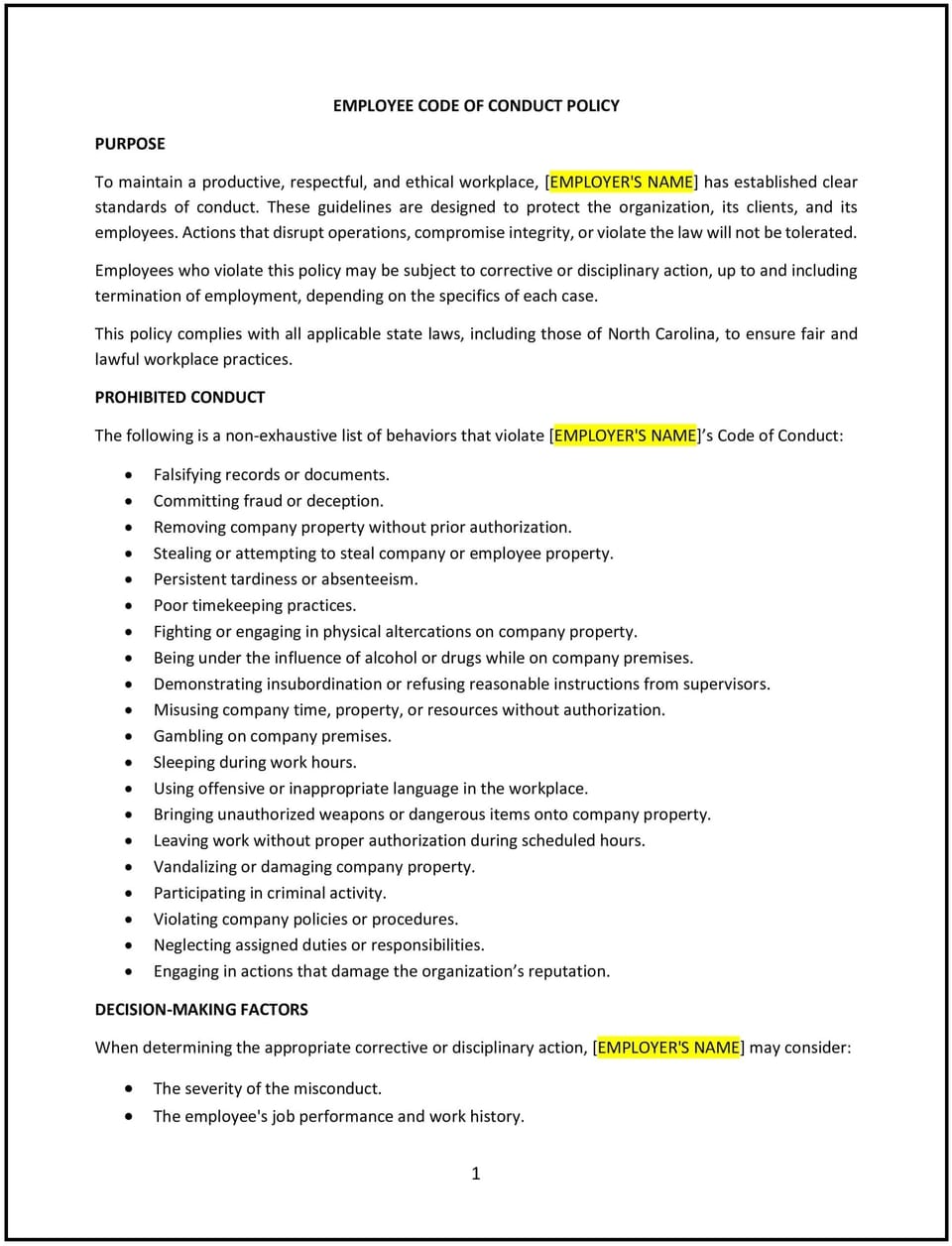Standards of conduct policy (North Carolina): Free template

Standards of conduct policy (North Carolina)
A standards of conduct policy helps North Carolina businesses set clear expectations for employee behavior and performance in the workplace. This policy outlines the standards employees are expected to meet, including ethical conduct, respect for coworkers, attendance, and compliance with company rules. It ensures that employees understand what is expected of them and the consequences for failing to adhere to these standards.
By adopting this policy, businesses can promote a respectful, productive, and professional work environment.
How to use this standards of conduct policy (North Carolina)
- Define expected behavior: Clearly outline the behaviors that are expected of employees, including professionalism, respect for others, punctuality, and adherence to company policies.
- Specify consequences for violations: Detail the disciplinary actions employees may face for not meeting the standards of conduct, including verbal warnings, written warnings, suspension, or termination.
- Address ethical conduct: Include guidelines for ethical behavior, such as honesty, integrity, and respect for confidentiality, particularly in dealings with customers, coworkers, and business partners.
- Reflect North Carolina-specific considerations: Ensure the policy complies with North Carolina’s labor laws and addresses any state-specific considerations for workplace behavior.
Benefits of using this standards of conduct policy (North Carolina)
This policy provides several benefits for North Carolina businesses:
- Promotes a positive work environment: Clear expectations help foster a professional, respectful, and collaborative workplace where employees feel valued and supported.
- Reduces legal risks: By establishing guidelines for behavior and setting consequences for violations, businesses can reduce the risk of legal claims related to discrimination, harassment, or other misconduct.
- Enhances employee performance: Employees who know what is expected of them are more likely to meet or exceed company standards, leading to improved productivity and job satisfaction.
- Increases accountability: A standards of conduct policy holds employees accountable for their actions, ensuring that the company’s values are upheld.
- Provides consistency: The policy ensures that all employees are treated fairly and consistently when it comes to behavior and performance expectations.
Tips for using this standards of conduct policy (North Carolina)
- Communicate the policy clearly: Ensure all employees understand the behavior expectations outlined in the policy and the consequences for non-compliance.
- Provide training: Offer training sessions to reinforce the importance of workplace conduct and ensure that employees understand the policy.
- Enforce consistently: Apply the standards of conduct policy consistently across all employees to prevent discrimination or favoritism.
- Review the policy regularly: The policy should be reviewed annually to ensure it reflects any changes in North Carolina labor laws or the company’s expectations.
Q: What behavior is expected from employees?
Employees are expected to act professionally, treat others with respect, adhere to company policies, and demonstrate ethical conduct both in the workplace and when representing the company outside of work.
Q: What are the consequences for violating the standards of conduct policy?
Violations of the policy may result in disciplinary actions, such as verbal or written warnings, suspension, or termination, depending on the severity of the violation.
Q: How often should the standards of conduct policy be reviewed?
The policy should be reviewed annually to ensure it remains aligned with North Carolina’s labor laws and the company’s expectations for employee behavior.
This article contains general legal information and does not contain legal advice. Cobrief is not a law firm or a substitute for an attorney or law firm. The law is complex and changes often. For legal advice, please ask a lawyer.


